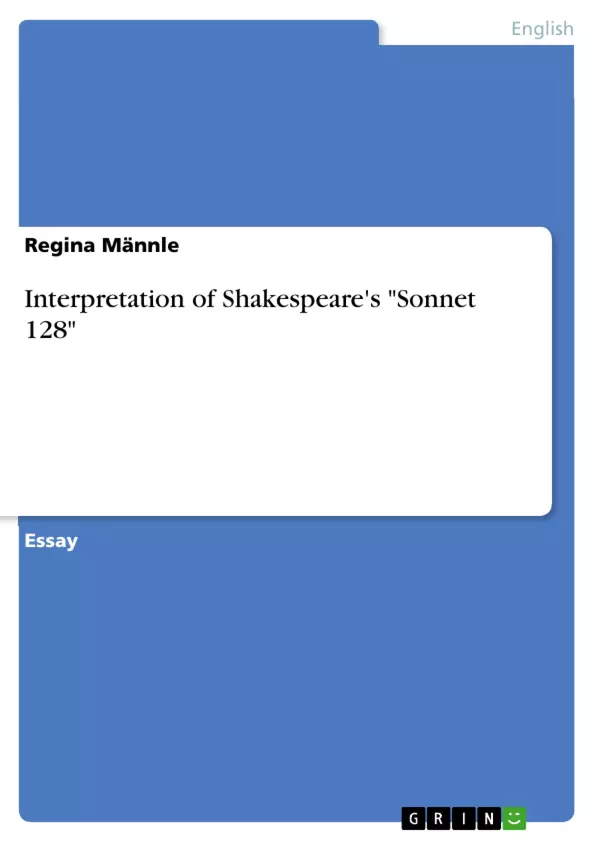Being so much in love that one envies everyone who gets in contact with the beloved person is probably something that all of us have experienced themselves. But in "Sonnet 128" Shakespeare presents a speaker of the poem who admires his mistress so deeply that he is even jealous of the objects that are close to her.
Although this poem deals with very strong feelings its external form does not reflect the highly confused state of emotion of the speaker. The poem follows strictly the form of the English sonnet with its three quatrains (consisting of alternate rhymes) and one concluding rhyming couplet that summarises the thoughts of the speaker. The rhymes are absolutely regular, too and the masculine end rhymes are without exception perfect rhymes. With just few exceptions (which will be examined in the next paragraphs) the iambic pentameter is also regular and evokes an atmosphere of harmony and calmness.
Table of Contents
- Interpretation of Shakespeare's "Sonnet 128"
- The Rhetorical Question
- The Speaker's Wish
- The Concluding Couplet
Objectives and Key Themes
This analysis of Shakespeare's "Sonnet 128" aims to explore the speaker's complex emotions of envy and desire, focusing on how the poem's form and language contribute to its overall meaning. The analysis examines how the speaker's yearning for his mistress leads to a fantastical and deeply personal interpretation of the relationship between the mistress, her instrument, and the speaker himself.
- Jealousy and Desire
- The Power of Language and Figurative Language
- Personification and Symbolism
- The Form of the Sonnet and its Role in Expressing Emotion
- The Theme of Love and its Complications
Chapter Summaries
The analysis of "Sonnet 128" begins by exploring the rhetorical question posed by the speaker, who envies the harpsichord for its closeness to his beloved mistress. Through a rich tapestry of figurative language, including metaphor and personification, the speaker expresses his desire to be as near to her as the instrument is. This section delves into the speaker's feelings of jealousy and the power of language to convey complex emotions.
The second part delves deeper into the speaker's wish to be touched by his mistress, highlighting his desire to literally become part of the instrument in order to experience the same physical closeness. The analysis explores the speaker's emotional confusion and the way the form of the sonnet contributes to this feeling of disarray.
Finally, the concluding couplet explores the speaker's attempt to resolve his envy by proposing a compromise. The speaker desires to "split up" the musician between the instrument and himself, suggesting a resolution to his jealousy.
Keywords
This analysis focuses on the concepts of envy, desire, personification, metaphor, sonnet form, figurative language, and the theme of love in Shakespeare's "Sonnet 128." The analysis also explores how these elements contribute to the overall meaning of the poem and the speaker's complex emotional journey.
- Quote paper
- Dipl.-Bibl. Regina Männle (Author), 2005, Interpretation of Shakespeare's "Sonnet 128", Munich, GRIN Verlag, https://www.grin.com/document/129003



